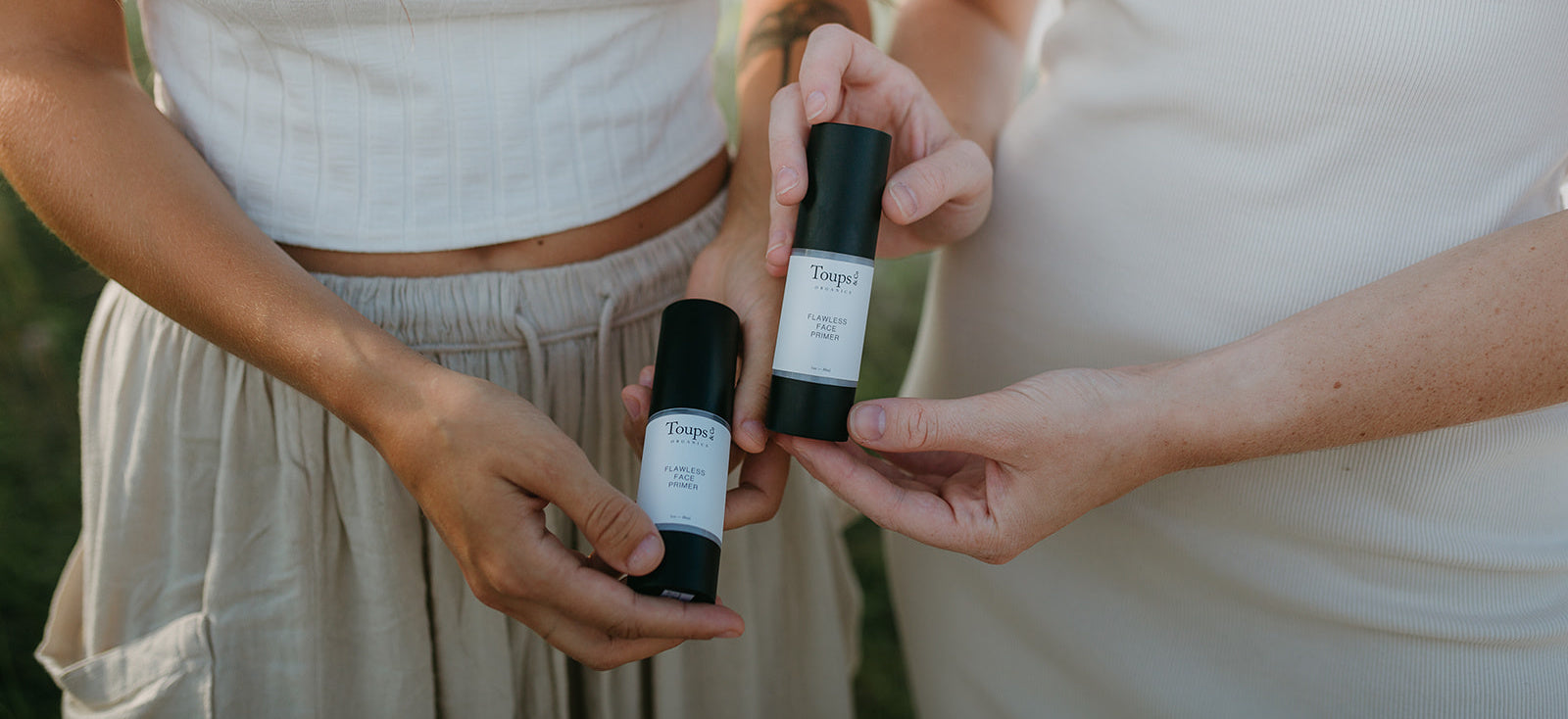A makeup primer (or face primer) is a somewhat controversial makeup product. It’s only been around since the early 2000s, and while makeup artists swear by it, it’s not a common product for an everyday look.
So is makeup primer worth adding an extra step to your makeup routine? Let’s explore all the commonly asked questions about makeup primer, ingredients you should consider, and how to apply it for best results.
Everything You Need to Know About Makeup Primer
Whether you’re totally new to makeup primer or you’re looking to elevate your routine, these fast facts can help you choose a face primer that’s right for your skin.
What Does Makeup Primer Do?
Face primers give your makeup an airbrushed finish. They’re the first makeup product applied to your skin (after skincare) and should minimize pores while creating a smooth canvas for your concealer and foundation. A high-quality makeup primer should feel sleek and hydrating, with ingredients that improve your complexion over time.
How Do Makeup Primers Work?
While moisturizers are designed to seep into pores, a face primer sits on top of your skin for better makeup application. People who use a makeup primer experience less creasing, a more even tone, and may notice that their makeup lasts longer.
Is Makeup Primer Necessary?
This depends on your makeup goals. Makeup primer is a game changer for aging skin, uneven skin tone, and makeup creasing. It’s recommended by makeup artists and works well for people who wear several products. If you want more coverage than a no-makeup makeup look, then you should absolutely include makeup primer in your everyday routine.
What Makeup Primer Should I Use?
As with any other makeup product, we recommend prioritizing ingredients. Hormone disruptors and toxins have no business in your makeup — especially in the products that are closest to your skin. Since makeup primer is used for all-day wear, it should double as a moisturizer and improve your tone, glow, and skin health over time.
Most makeup primers are silicone based, but they don’t have to be. We get the same results (or better) with aloe vera, jojoba oil, and squalane. You can also use coconut oil, green tea extracts, vitamin E oil, and witch hazel.
Is Primer Makeup or Skincare?
Ideally, it’s both. Although makeup primer isn’t as targeted as your typical serum or moisturizer, it should support the health of your skin with intentional ingredients.
Makeup primer is the first product you apply to your face. Meaning, it has a unique opportunity to smooth and nourish your complexion. When you use a toxin-filled primer (one that’s made from silicone), you lose the skincare opportunity and give your body more toxins to sort through.
Does Makeup Primer Expire?
Makeup and skincare products shouldn’t last forever (if they do, we’re skeptical). Products that have a longer shelf life are likely to be packed full of preservatives, like formaldehyde releasers, parabens, and alcohol.
The average shelf life of a makeup primer is between six and twelve months. We recommend using ours for about six months. While we do include oregano extract (a natural antimicrobial and antifungal), natural makeup products can go bad quicker than chemical-based options.
What Toxic Ingredients Can Be Found in Drugstore Makeup Primer?
Mainstream makeup primers are made with two different base options: water or silicone. A water-based makeup primer should absorb more into the skin, while a silicone based primer sits on top of it.
Since water can easily mold, many water-based makeup primers include preservatives, like alcohol, ethanol, parabens, emulsifiers, heavy metals, and fragrances.
On the other hand, silicone-based makeup primers are more likely to clog and stretch pores. They’re bad for the environment, disrupt hormones, and upset the skin barrier. Similar to water-based primers, the silicone ones also include preservatives and other chemicals.
What Ingredients Should I Look for in a Clean Makeup Primer?
We never want to promote the idea that makeup is a substitute for skincare. It isn’t. Makeup products enhance your natural beauty, but every product you use on your face should promote skin barrier function and a natural glow.
Remember, no artificial products can replace good skin health.
When purchasing a clean makeup primer, you want ingredients that aren’t just nontoxic but also promote health. And finding a nourishing makeup primer is easier than you think. Look for ingredients like jojoba oil (similar to your sebum), aloe vera (extremely moisturizing), and green tea extract (packed with antioxidants).
How to Apply Makeup Primer
Always use makeup primer after your skincare routine and start with a clean face. You’ll start with a pea-sized amount of primer and blend it gently across your face with your fingers. Start at the base of your nose and blend out toward your cheekbones. For best results, wait until your primer has dried before applying concealer and foundation.
The Best Makeup Primer for Your Skin
It’s recommended to choose a makeup primer based on your skin type. Here are some ingredients that can help soothe sensitive skin, prevent breakouts, and support aging skin:
Clean Makeup Primer for Sensitive Skin
If you have sensitive skin, you’ll want a primer that’s silicone free. You’ll also want to check for other irritating ingredients, like synthetic fragrances and formaldehyde releasers. In general, you should avoid oil bases, unless it’s jojoba oil (which has a similar chemical makeup to your own sebum). If you do use oils on your skin, make sure they’re cold-pressed and minimally processed, with the nutrients intact.
Clean Makeup Primer for Wrinkles and Aging Skin
Makeup primer is one of the best ways to support aging skin. But for women over thirty, it’s not widely recognized (meaning, it’s kind of a hidden gem). Makeup primer should help moisturize your skin throughout the day while smoothing creases and fine lines. Look for ingredients that are hydrating (like aloe vera), with antioxidants for cell health.
Clean Makeup Primer for Teens
For teens, a makeup primer helps smooth acne bumps. If your teen is wearing foundation, they’ll notice a less cakey application, too. The most important thing about buying makeup primer for teens is to avoid silicone. Not only is silicone being studied as a potential hormone disruptor, but it’s also known to clog pores and disrupt the skin barrier.
You’ll also want to steer clear of any other known hormone disruptors, including parabens, phthalates, and fragrances. A clean makeup primer for teens should have a handful of recognizable ingredients that balance the skin barrier and relieve acne.
Clean Makeup Primer That Doubles as Skincare
Makeup is part of skincare. Anything you put on your face should promote a better complexion, build a healthy skin barrier, and support sebum function. With high-quality ingredients and natural formulas available to us, there’s no reason why this shouldn’t be the standard.
If you want a clean makeup primer that doubles as skincare, prioritize minimal ingredients that are recognizable and nutrient-dense. Vitamin E, coconut oil, jojoba oil, aloe vera, squalane, and plant extracts can all be used to create a palette for your makeup. Most of the time, they’re just as effective as the drugstore brands (and they shouldn’t disrupt your skin barrier).
Makeup Primer Goes Beyond Smooth Application
A makeup product should never be limited to just one benefit. Viewing our makeup this way creates overconsumption, unnatural breakouts, and poor skincare standards.
Instead, we deserve to see our skin as an ecosystem that’s constantly working to protect and restore our bodies (because it is). Our largest organ, the skin, is made of sebum, healthy bacteria, fatty acids, minerals, and so much more.
When searching for the best makeup primer, remember that each ingredient should be working with your skin, not against it.

